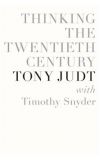
04 Feb 2013 10:44:39
Fame came too late for Tony Judt. He was 57 in 2005 when he published his history of Europe after 1945, Postwar, the book that sealed his reputation worldwide. Three years later he was diagnosed with motor neurone disease. Two years after that, he was gone. Which means that his last book, Thinking the Twentieth Century, like Proust's À la recherche du temps perdu, was written – dictated, actually – in bed. And fittingly enough, the first section of each of the book's nine chapters is given over to Judt's own remembrances of things past: his grandparents' origins in Russia, Romania, Lithuania and Poland; his parents' meeting in wartime London; the family's non-stop talk about the Holocaust (Judt's father's cousin, Toni, for whom Tony was named, was murdered in Auschwitz); his precocity at school (for his 13th birthday his father gave him Isaac Deutscher's three-volume biography of Trotsky) and reading history at King's College, Cambridge, where he was awarded an exhibition the year before he was due to sit his A-levels (he never did take them).
Joyous as it is to read these reveries, though, it's what Judt remembers about the rest of the world that really counts. After the success of Postwar he had planned to write a history of 20th-century intellectual life, a plan put paid to by his illness. And then, as Judt was composing the short autobiographical bulletins that went to make up The Memory Chalet, Timothy Snyder, a historian of eastern Europe a couple of decades his junior, proposed they do the book together, not as a protracted question and answer session but as an extended dialogue in which they would mull over the mechanics of modern thought. The result is a masterpiece that ranges from Matthew Arnold to Stefan Zweig by way of Hayek, Hobsbawm and (the book's real hero) Keynes and will humble anyone who thinks themselves even remotely cultivated. How, you keep asking yourself, could one man remember all this narrative detail, these abstruse references, these verbatim quotations?
Not that Snyder is a slouch on the memory front. There are times when he caps a triumphant Judt recital with one of his own. But he can get too abstracted – witness his ruminations on the Hegelian dialectic – and he has nothing to match Judt's mordant aperçus and aphorisms. Thus the Bloomsbury set evinced "the very English idea that aesthetic preferences are foundational for political and (especially) moral views". Thus Marx was "both an exemplary French political pamphleteer and a minor commentator on classical British economics". Thus "the time has … come to distinguish between Israel and the Holocaust, since the latter should not be allowed to serve as a get-out-of-jail-free card for a rogue state". Phrases like these crop up on nearly every page of this valiant book. Read it and weep that there shall be no more.

